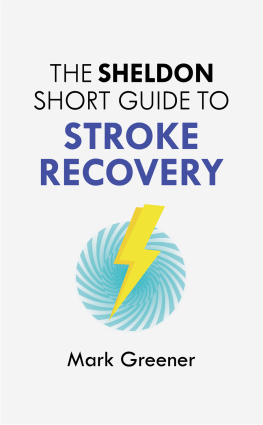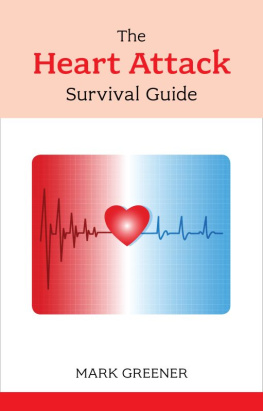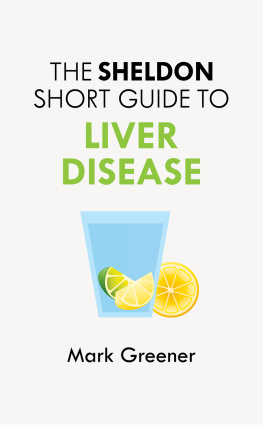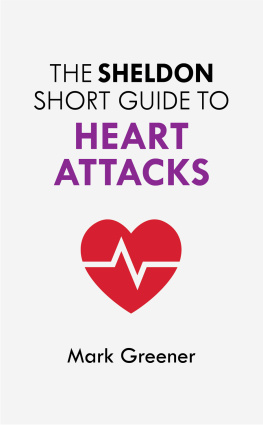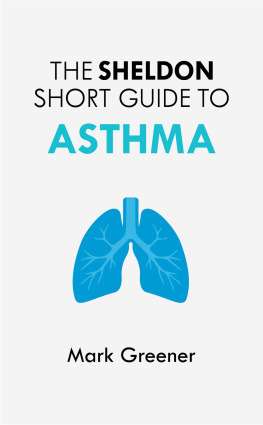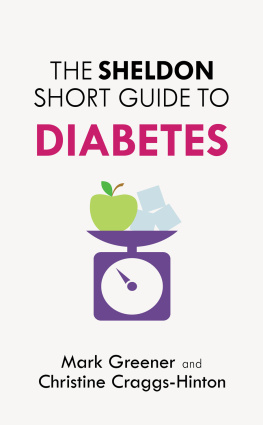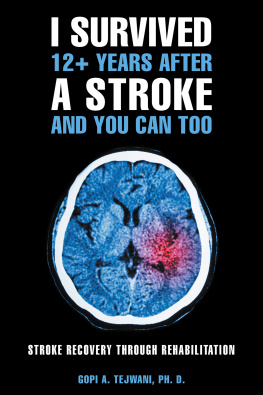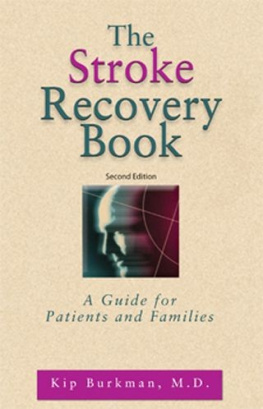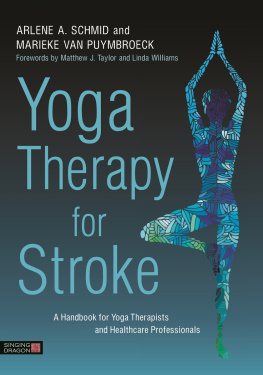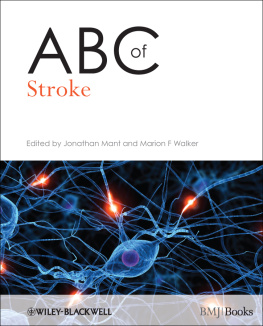
The Sheldon Short Guide to
Stroke Recovery
Mark Greener spent a decade in biomedical research before joining MIMS Magazine for GPs in 1989. Since then, he has written on health and biology for magazines worldwide for patients, healthcare professionals and scientists. He is a member of the Royal Society of Biology and is the author of 21 other books, including The Heart Attack Survival Guide (2012) and The Holistic Health Handbook (2013), both published by Sheldon Press. Mark lives with his wife, three children and two cats in a Cambridgeshire village.
Sheldon Short Guides
Asthma
Mark Greener
Depression
Dr Tim Cantopher
Diabetes
Mark Greener and Christine Craggs-Hinton
Heart Attacks
Mark Greener
Liver Disease
Mark Greener
Memory Problems
Dr Sallie Baxendale
Phobias and Panic
Professor Kevin Gournay
Stroke Recovery
Mark Greener
Worry and Anxiety
Dr Frank Tallis
THE SHELDON
SHORT GUIDE TO
STROKE
RECOVERY
Mark Greener

First published in Great Britain in 2016 by Sheldon Press
An Hachette UK Company
Sheldon Press
Carmelite House
50 Victoria Embankment
London EC4Y 0DZ
www.sheldonpress.co.uk
Copyright Mark Greener 2016
All rights reserved. No part of this book may be reproduced or transmitted in any form or by any means, electronic or mechanical, including photocopying, recording, or by any information storage and retrieval system, without permission in writing from the publisher.
The author and publisher have made every effort to ensure that the external website and email addresses included in this book are correct and up to date at the time of going to press. The author and publisher are not responsible for the content, quality or continuing accessibility of the sites.
British Library Cataloguing-in-Publication Data
A catalogue record for this book is available from the British Library
ISBN 9781847094025
This is not a medical book and is not intended to replace advice from your doctor. Consult your stroke team, pharmacist or doctor if you believe you have any of the symptoms described, and if you think you might need medical help.
I used numerous medical and scientific papers to write the book that this Sheldon Short is based on: The Stroke Survival Guide . Unfortunately, there isnt space to include references in this short summary. You can find these in The Stroke Survival Guide , which discusses the topics in more detail. I updated some facts and figures for this book.
The Stroke Association () says that there are about 152,000 strokes a year in the UK one every three-and-a-half minutes. Modern treatments mean that more people survive and recover more fully than before. Nevertheless, a quarter of strokes prove fatal within a year. Indeed, in 2012, strokes were the fourth leading cause of death among men in England and Wales, and the third leading cause among women. Furthermore, half the survivors have some disability often affecting tasks most of us take for granted such as walking, bathing, dressing, eating and using the toilet.
Your recovery partly depends on your commitment and that of your partner or other carers. You will need to practise exercises, learn to live within any disability, perhaps deal with altered relationships, and make lifestyle changes. People who survive a stroke even a mini-stroke, also called a transient ischaemic attack (TIA) are much more likely to suffer another, a heart attack or other cardiovascular (heart and blood vessel) diseases. Combining medicines and lifestyle changes can reduce the risk of cardiovascular diseases by four-fifths over five years.
Sometimes a stroke leaves hidden disabilities, such as problems with memory, thinking or concentration, depression and anxiety, and personality changes. The sympathy, help and support that survivors and their carers receive is often much less for these hidden problems than for physical disabilities. Not surprisingly, carers are prone to stress, anxiety and depression and may receive little help and advice. So, I hope that this book also supports spouses, family members and other carers. I wish you well.
Get help as soon as possible
Nineteen in every 20 strokes begin outside hospital, and the sooner you act the better the chances of a full recovery. Call 999 or go to the local accident and emergency department if you or someone around you experiences any of the following:
Weakness or numbness in the face, arm or leg (Can the person smile? Has his or her eye or mouth dropped? Can he or she raise both arms?)
Loss or slurring of speech (Can the person speak clearly and understand what you say?)
Loss or blurring of vision
A sensation of motion (vertigo)
Difficulty with balance
Unusual, sudden or severe headache.
Strokes occur when the brains blood supply is blocked. Your brain accounts for about 2 per cent of your weight but uses about 20 per cent of your bodys glucose (the sugar that fuels the body). During most strokes, brain cells dont get enough oxygen, glucose and other nutrients and so die. The effects on the body or mind depend on the site of the damage ( overleaf):
Damage to a part of the brain that controls movement can cause motor problems, such as weakness, poor dexterity, painful muscle spasms and abnormal postures.
Damage to the part that processes information can cause cognitive impairment: the survivor is less able to think clearly, remember things, solve problems and plan.
Damage to areas that ensure that you breathe, that your heart beats and that you digest food can prove fatal.
A strokes effects also depend on the extent of the damage. You may not even realize that you have had a very mild stroke or TIA. Extensive damage can be fatal or occasionally result in:
vegetative state, where the survivor is awake but does not show any signs of awareness;
locked-in syndrome, where the survivor is conscious and aware, but paralysed.
The brainstem, for example, ensures that our basic biological functions such as breathing, heart rate and swallowing continue without us thinking about them, even when we are asleep. The brainstem also helps with vision, hearing, balance, movement, the sleepwake cycle, alertness and keeping our body temperature constant. Strokes that damage a large part of the brainstem can prove fatal or leave the survivor in a vegetative state. Even damage to a small part of the brainstem can cause debilitating problems with, for example, vision, balance and swallowing as well as weak or numb face or limbs.
The cerebellum controls timing and patterns of movement, and aids balance and coordination. It stores patterns of muscle movements used, for example, when you take part in sport or play an instrument and helps maintain posture. So, a stroke that damages the cerebellum can cause unsteadiness, poor coordination and clumsiness.
The cerebrum analyses information received from the rest of the body, including our senses, compares our situation with our knowledge and experience, decides if we need to act and sends messages to our muscles. Each of the cerebrums two hemispheres controls the opposite side. So, a stroke that damages the right hemisphere affects movement on the left side. In most people, the right hemisphere also:
recognizes shapes, angles, proportions, patterns, faces and so on;
controls emotions, creativity and imagination;
is responsible for your awareness of your body.
The left hemisphere oversees analytical thought, problem solving, language, speech and understanding. A thick cord of nerves connects the hemispheres one reason why the brain sometimes compensates for a strokes effects: the other hemisphere takes over.
Next page
